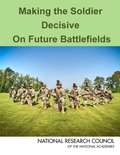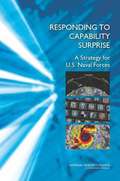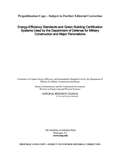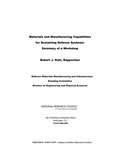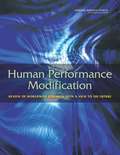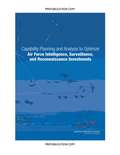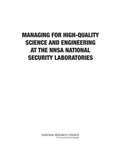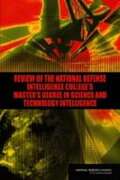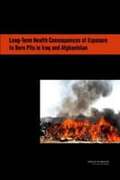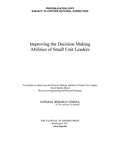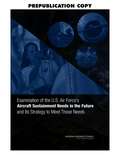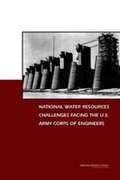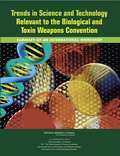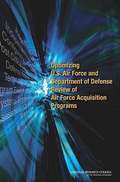- Table View
- List View
Making the Soldier Decisive on Future Battlefields
by Division On Engineering Physical SciencesThe U. S. military does not believe its soldiers, sailors, airmen, and marines should be engaged in combat with adversaries on a "level playing field. " Our combat individuals enter engagements to win. To that end, the United States has used its technical prowess and industrial capability to develop decisive weapons that overmatch those of potential enemies. In its current engagement--what has been identified as an "era of persistent conflict"-- the nation's most important weapon is the dismounted soldier operating in small units. Today's soldier must be prepared to contend with both regular and irregular adversaries. Results in Iraq and Afghanistan show that, while the U. S. soldier is a formidable fighter, the contemporary suite of equipment and support does not afford the same high degree of overmatch capability exhibited by large weapons platforms--yet it is the soldier who ultimately will play the decisive role in restoring stability. Making the Soldier Decisive on Future Battlefields establishes the technical requirements for overmatch capability for dismounted soldiers operating individually or in small units. It prescribes technological and organizational capabilities needed to make the dismounted soldier a decisive weapon in a changing, uncertain, and complex future environment and provides the Army with 15 recommendations on how to focus its efforts to enable the soldier and tactical small unit (TSU) to achieve overmatch.
Responding to Capability Surprise
by National Research Council Naval Studies Board Division on Engineering and Physical Sciences Committee on Capability Surprise on U.S. Naval ForcesFrom a military operational standpoint, surprise is an event or capability that could affect the outcome of a mission or campaign for which preparations are not in place. By definition, it is not possible to truly anticipate surprise. It is only possible to prevent it (in the sense of minimizing the number of possible surprises by appropriate planning), to create systems that are resilient to an adversary's unexpected actions, or to rapidly and effectively respond when surprised. Responding to Capability Surprise examines the issues surrounding capability surprise, both operational and technical, facing the U.S. Navy, Marine Corps, and Coast Guard. This report selects a few surprises from across a continuum of surprises, from disruptive technologies, to intelligence-inferred capability developments, to operational deployments, and assesses what the Naval Forces are doing (and could do) about them while being mindful of future budgetary declines. The report then examines which processes are in place or could be in place in the Navy, the Marine Corps, and the Coast Guard to address such surprises. Today's U.S. naval forces continue to face a wide range of potential threats in the indefinite future and for this reason must continue to balance and meet their force structure needs. The recommendations of Responding to Capability Surprise will help to ensure more responsive, more resilient, and more adaptive behavior across the organization from the most senior leadership to the individual sailors, Marines, and Coast Guardsmen.
Zero-Sustainment Aircraft for the U.S. Air Force
by National Research CouncilOverall Air Force weapon system sustainment (WSS) costs are growing at more than 4 percent per year, while budgets have remained essentially flat. The cost growth is due partly to aging of the aircraft fleet, and partly to the cost of supporting higher-performance aircraft and new capabilities provided by more complex and sophisticated systems, such as the latest intelligence, surveillance, and reconnaissance (ISR) platforms. Furthermore, the expectation for the foreseeable future is that sustainment budgets are likely to decrease, so that the gap between budgets and sustainment needs will likely continue to grow wider. Most observers accept that the Air Force will have to adopt new approaches to WSS if it is going to address this problem and remain capable of carrying out its missions. In this context, the original intent of this 3-day workshop was to focus on ways that science and technology (S&T) could help the Air Force reduce sustainment costs. However, as the workshop evolved, the discussions focused more and more on Air Force leadership, management authority, and culture as the more critical factors that need to change in order to solve sustainment problems. Many participants felt that while S&T investments could certainly help--particularly if applied in the early stages ("to the left") of the product life cycle--adopting a transformational management approach that defines the user-driven goals of the enterprise, empowers people to achieve them, and holds them accountable, down to the shop level. Several workshop participants urged Air Force leaders to start the process now, even though it will take years to percolate down through the entire organization. These sustainment concerns are not new and have been studied extensively, including recent reports from the National Research Council's Air Force Studies Board and the Air Force Scientific Advisory Board.
Energy-Efficiency Standards and Green Building Certification Systems Used by the Department of Defense for Military Construction and Major Renovations
by National Research Council Division on Engineering and Physical Sciences Board on Infrastructure and the Constructed Environment Committee to Evaluate Energy-Efficiency and Sustainability Standards Used by the Department of Defense for Military Construction and RepairCongress has an ongoing interest in ensuring that the 500,000 buildings and other structures owned and operated by the Department of Defense (DOD) are operated effectively in terms of cost and resource use. Section 2830 of the National Defense Authorization Act for fiscal year requires the Secretary of Defense to submit a report to the congressional defense committees on the energy-efficiency and sustainability standards used by DOD for military construction and major renovations of buildings. DOD's report must include a cost-benefit analysis, return on investment, and long-term payback for the building standards and green building certification systems, including: (A) American Society of Heating, Refrigerating and Air-Conditioning Engineers (ASHRAE) Standard 189.1-2011 for the Design of High-Performance, Green Buildings Except Low-Rise Residential. (B) ASHRAE Energy Standard 90.1-2010 for Buildings Except Low-Rise Residential. (C) Leadership in Energy and Environmental Design (LEED) Silver, Gold, and Platinum certification for green buildings, as well as the LEED Volume certification. (D) Other American National Standards Institute (ANSI) accredited standards. DOD's report to the congressional defense committees must also include a copy of DOD policy prescribing a comprehensive strategy for the pursuit of design and building standards across the department that include specific energy-efficiency standards and sustainable design attributes for military construction based on the cost-benefit analysis, return on investment, and demonstrated payback required for the aforementioned building standards and green building certification systems. Energy-Efficiency Standards and Green Building Certification Systems Used by the Department of Defense for Military Construction and Major Renovations summarizes the recommendations for energy efficiency.
Energy Reduction at U.S. Air Force Facilities Using Industrial Processes
by Rapporteur Gregory EyringThe Department of Defense (DoD) is the largest consumer of energy in the federal government. In turn, the U. S. Air Force is the largest consumer of energy in the DoD, with a total annual energy expenditure of around $10 billion. Approximately 84 percent of Air Force energy use involves liquid fuel consumed in aviation whereas approximately 12 percent is energy (primarily electricity) used in facilities on the ground. This workshop was concerned primarily with opportunities to reduce energy consumption within Air Force facilities that employ energy intensive industrial processes--for example, assembly/disassembly, painting, metal working, and operation of radar facilities--such as those that occur in the maintenance depots and testing facilities. Air Force efforts to reduce energy consumption are driven largely by external goals and mandates derived from Congressional legislation and executive orders. To date, these goals and mandates have targeted the energy used at the building or facility level rather than in specific industrial processes. In response to a request from the Deputy Assistant Secretary of the Air Force for Energy and the Deputy Assistant Secretary of the Air Force for Science, Technology, and Engineering, the National Research Council, under the auspices of the Air Force Studies Board, formed the Committee on Energy Reduction at U. S. Air Force Facilities Using Industrial Processes: A Workshop. The terms of reference called for a committee to plan and convene one 3 day public workshop to discuss: (1) what are the current industrial processes that are least efficient and most cost ineffective? (2) what are best practices in comparable facilities for comparable processes to achieve energy efficiency? (3) what are the potential applications for the best practices to be found in comparable facilities for comparable processes to achieve energy efficiency? (4) what are constraints and considerations that might limit applicability to Air Force facilities and processes over the next ten year implementation time frame? (5) what are the costs and paybacks from implementation of the best practices? (6) what will be a proposed resulting scheme of priorities for study and implementation of the identified best practices? (7) what does a holistic representation of energy and water consumption look like within operations and maintenance?
Materials and Manufacturing Capabilities for Sustaining Defense Systems
by National Research Council Division on Engineering and Physical Sciences Defense Materials Manufacturing and Infrastructure Standing Committee Robert J. KattThe Standing Committee on Defense Materials Manufacturing and Infrastructure (DMMI) conducted a workshop on July 23-24, 2012, to share information and gather perspectives on issues concerning Materials and Manufacturing Capabilities for Sustaining Defense Systems. This workshop, held at the headquarters building of the National Academies, 2101 Constitution Avenue N.W., Washington D.C., was conducted according to the procedures of the National Research Council (NRC) for a convening activity. That is, all workshop participants--including presenters, members of the DMMI standing committee, Reliance 21, invited guests, and visitors--spoke as individuals, and no overall findings, conclusions, or recommendations were developed during or as a result of the workshop. All statements and views summarized in this publication are attributable only to those individuals who expressed them. It is worth noting that the sponsor, Reliance 21, is a Department of Defense group of professionals that was established to enable the DOD science and technology (S&T) community to work together to enhance Defense S&T programs, eliminate unwarranted duplication, and strengthen cooperation among the military services and other DOD agencies. The DMMI standing committee named a workshop planning group to develop the workshop agenda and decide on invited guests and presenters, in accordance with the statement of task approved by the Governing Board of the NRC. The planning group also consulted with the Reliance 21 materials and processing community of interest. The presentations and discussions during the workshop are summarized sequentially in the main part of this report. As an aid to readers, nine themes have been identified by the author that recurred in multiple presentations and discussions. Materials and Manufacturing Capabilities for Sustaining Defense Systems: Summary of a Workshop explains these nine themes and summarizes the two day workshop.
Determining Core Capabilities in Chemical and Biological Defense Science and Technology
by Development Committee on Determining Core Capabilities in Chemical Biological Defense ResearchThe goal of the U. S. Department of Defense's (DoD's) Chemical and Biological Defense Program (CBDP) is to provide support and world-class capabilities enabling he U. S. Armed Forces to fight and win decisively in chemical, biological, radiological, and nuclear (CBRN) environments. To accomplish this objective, the CBDP must maintain robust science and technology capabilities to support the research, development, testing, and evaluation required for the creation and validation of the products the program supplies. The threat from chemical and biological attack evolves due to the changing nature of conflict and rapid advances in science and technology (S&T), so the core S&T capabilities that must be maintained by the CBDP must also continue to evolve. In order to address the challenges facing the DoD, the Deputy Assistant Secretary of Defense (DASD) for Chemical and Biological Defense (CBD) asked the National Research Council (NRC) to conduct a study to identify the core capabilities in S&T that must be supported by the program. The NRC Committee on Determining Core Capabilities in Chemical and Biological Defense Research and Development examined the capabilities necessary for the chemical and biological defense S&T program in the context of the threat and of the program's stated mission and priorities. Determining Core Capabilities in Chemical and Biological Defense Science and Technology contains the committee's findings and recommendations. It is intended to assist the DASD CBD in determining the best strategy for acquiring, developing, and/or maintaining the needed capabilities.
Returning Home from Iraq and Afghanistan
by Institute of MedicineAs of December 2012, Operation Enduring Freedom (OEF) in Afghanistan and Operation Iraqi Freedom (OIF) in Iraq have resulted in the deployment of about 2. 2 million troops; there have been 2,222 US fatalities in OEF and Operation New Dawn (OND)1 and 4,422 in OIF. The numbers of wounded US troops exceed 16,000 in Afghanistan and 32,000 in Iraq. In addition to deaths and morbidity, the operations have unforeseen consequences that are yet to be fully understood. In contrast with previous conflicts, the all-volunteer military has experienced numerous deployments of individual service members; has seen increased deployments of women, parents of young children, and reserve and National Guard troops; and in some cases has been subject to longer deployments and shorter times at home between deployments. Numerous reports in the popular press have made the public aware of issues that have pointed to the difficulty of military personnel in readjusting after returning from Iraq and Afghanistan. Many of those who have served in OEF and OIF readjust with few difficulties, but others have problems in readjusting to home, reconnecting with family members, finding employment, and returning to school. In response to the return of large numbers of veterans from Iraq and Afghanistan with physical-health and mental-health problems and to the growing readjustment needs of active duty service members, veterans, and their family members, Congress included Section 1661 of the National Defense Authorization Act for fiscal year 2008. That section required the secretary of defense, in consultation with the secretary of veterans affairs, to enter into an agreement with the National Academies for a study of the physical-health, mental-health, and other readjustment needs of members and former members of the armed forces who were deployed in OIF or OEF, their families, and their communities as a result of such deployment. The study consisted of two phases. The Phase 1 task was to conduct a preliminary assessment. The Phase 2 task was to provide a comprehensive assessment of the physical, psychologic, social, and economic effects of deployment on and identification of gaps in care for members and former members, their families, and their communities. The Phase 1 report was completed in March 2010 and delivered to the Department of Defense (DOD), the Department of Veterans Affairs (VA), and the relevant committees of the House of Representatives and the Senate. The secretaries of DOD and VA responded to the Phase 1 report in September 2010. Returning Home from Iraq and Afghanistan: Assessment of Readjustment Needs of Veterans, Service Members, and Their Families fulfills the requirement for Phase 2.
Evaluation of the Lovell Federal Health Care Center Merger: Findings, Conclusions, and Recommendations
by Committee on Evaluation of the Lovell Federal Health Care Center MergerThe 2010 opening of the Captain James A. Lovell Federal Health Care Center (FHCC) created a joint entity between the Department of Defense (DoD) and the Department of Veterans Affairs (VA) that replaced two separate centers in North Chicago. VA and DoD leaders envisioned a state-of-the-art facility that would deliver health care to both DoD and VA beneficiaries from northern Illinois to southern Wisconsin, providing service members and veterans seamless access to an expanded array of medical services. Unprecedented for the military and the VA, the Lovell FHCC would integrate clinical and administrative services under a single line of authority. The DoD asked the IOM to evaluate whether the Lovell FHCC has improved health care access, quality, and cost for the DoD and the VA, compared with operating separate facilities, and to examine whether patients and health care providers are satisfied with joint VA/DoD delivery of health care. Evaluation of the Lovell Federal Health Care Center Merger: Findings, conclusions, and Recommendations finds that initial implementation of the Lovell FHCC has provided important lessons about how to integrate VA and DoD health care services and has identified remaining obstacles that the departments could overcome to make such mergers more effective and less costly to implement. The IOM recommends that the VA and the DoD develop a comprehensive evaluation plan to objectively judge its success or failure, with measurable criteria, that would provide essential knowledge for both the Lovell FHCC and future endeavors.
Human Performance Modification
by National Research Council Division on Engineering and Physical Sciences Division of Behavioral and Social Sciences and Education Board on Behavioral, Cognitive, and Sensory Sciences Committee on Assessing Foreign Technology Development in Human Performance ModificationThe development of technologies to modify natural human physical and cognitive performance is one of increasing interest and concern, especially among military services that may be called on to defeat foreign powers with enhanced warfighter capabilities. Human performance modification (HPM) is a general term that can encompass actions ranging from the use of "natural" materials, such as caffeine or khat as a stimulant, to the application of nanotechnology as a drug delivery mechanism or in an invasive brain implant. Although the literature on HPM typically addresses methods that enhance performance, another possible focus is methods that degrade performance or negatively affect a military force's ability to fight. Advances in medicine, biology, electronics, and computation have enabled an increasingly sophisticated ability to modify the human body, and such innovations will undoubtedly be adopted by military forces, with potential consequences for both sides of the battle lines. Although some innovations may be developed for purely military applications, they are increasingly unlikely to remain exclusively in that sphere because of the globalization and internationalization of the commercial research base. Based on its review of the literature, the presentations it received and on its own expertise, the Committee on Assessing Foreign Technology Development in Human Performance Modification chose to focus on three general areas of HPM: human cognitive modification as a computational problem, human performance modification as a biological problem, and human performance modification as a function of the brain-computer interface. Human Performance Modification: Review of Worldwide Research with a View to the Future summarizes these findings.
Substance Use Disorders In The U.S. Armed Forces
by Committee on Prevention Treatment Diagnosis Management of Substance Use Disorders in the U.S. Armed ForcesProblems stemming from the misuse and abuse of alcohol and other drugs are by no means a new phenomenon, although the face of the issues has changed in recent years. National trends indicate substantial increases in the abuse of prescription medications. These increases are particularly prominent within the military, a population that also continues to experience long-standing issues with alcohol abuse. The problem of substance abuse within the military has come under new scrutiny in the context of the two concurrent wars in which the United States has been engaged during the past decade--in Afghanistan (Operation Enduring Freedom) and Iraq (Operation Iraqi Freedom and Operation New Dawn). Increasing rates of alcohol and other drug misuse adversely affect military readiness, family readiness, and safety, thereby posing a significant public health problem for the Department of Defense (DoD). To better understand this problem, DoD requested that the Institute of Medicine (IOM) assess the adequacy of current protocols in place across DoD and the different branches of the military pertaining to the prevention, screening, diagnosis, and treatment of substance use disorders (SUDs). Substance Use Disorders in the U. S. Armed Forces reviews the IOM's task of assessing access to SUD care for service members, members of the National Guard and Reserves, and military dependents, as well as the education and credentialing of SUD care providers, and offers specific recommendations to DoD on where and how improvements in these areas could be made.
Assessment of Agent Monitoring Strategies for the Blue Grass and Pueblo Chemical Agent Destruction Pilot Plants
by Committee on Assessment of Agent Monitoring Strategies for the Blue Grass Pueblo Chemical Agent Destruction Pilot PlantsJanuary 2012 saw the completion of the U. S. Army's Chemical Materials Agency's (CMA's) task to destroy 90 percent of the nation's stockpile of chemical weapons. CMA completed destruction of the chemical agents and associated weapons deployed overseas, which were transported to Johnston Atoll, southwest of Hawaii, and demilitarized there. The remaining 10 percent of the nation's chemical weapons stockpile is stored at two continental U. S. depots, in Lexington, Kentucky, and Pueblo, Colorado. Their destruction has been assigned to a separate U. S. Army organization, the Assembled Chemical Weapons Alternatives (ACWA) Element. ACWA is currently constructing the last two chemical weapons disposal facilities, the Pueblo and Blue Grass Chemical Agent Destruction Pilot Plants (denoted PCAPP and BGCAPP), with weapons destruction activities scheduled to start in 2015 and 2020, respectively. ACWA is charged with destroying the mustard agent stockpile at Pueblo and the nerve and mustard agent stockpile at Blue Grass without using the multiple incinerators and furnaces used at the five CMA demilitarization plants that dealt with assembled chemical weapons - munitions containing both chemical agents and explosive/propulsive components. The two ACWA demilitarization facilities are congressionally mandated to employ noncombustion-based chemical neutralization processes to destroy chemical agents. In order to safely operate its disposal plants, CMA developed methods and procedures to monitor chemical agent contamination of both secondary waste materials and plant structural components. ACWA currently plans to adopt these methods and procedures for use at these facilities. The Assessment of Agent Monitoring Strategies for the Blue Grass and Pueblo Chemical Agent Destruction Pilot Plants report also develops and describes a half-dozen scenarios involving prospective ACWA secondary waste characterization, process equipment maintenance and changeover activities, and closure agent decontamination challenges, where direct, real-time agent contamination measurements on surfaces or in porous bulk materials might allow more efficient and possibly safer operations if suitable analytical technology is available and affordable.
Capability Planning and Analysis to Optimize Air Force Intelligence, Surveillance, and Reconnaissance Investments
by National Research Council Division on Engineering and Physical Sciences Committee on Examination of the Air Force Intelligence, Surveillance, and Reconnaissance (ISR) Capability Planning and Analysis (CPA&A) Process Air Force Studies BoardIntelligence, surveillance, and reconnaissance (ISR) capabilities have expanded situation awareness for U.S. forces, provided for more precise combat effects, and enabled better decision making both during conflicts and in peacetime, and reliance on ISR capabilities is expected to increase in the future. ISR capabilities are critical to 3 of the 12 Service Core Functions of the U.S. Air Force: namely, Global Integrated ISR (GIISR) and the ISR components of Cyberspace Superiority and Space Superiority, and contribute to all others. In response to a request from the Air Force for ISR and the Deputy Assistant Secretary of the Air Force for Science, Technology, and Engineering, the National Research Council formed the Committee on Examination of the Air Force Intelligence, Surveillance, and Reconnaissance (ISR) Capability Planning and Analysis (CP&A) Process. In this report, the committee reviews the current approach to the Air Force corporate planning and programming process for ISR capability generation; examines carious analytical methods, processes, and models for large-scale, complex domains like ISR; and identifies the best practices for the Air Force. In Capability Planning and Analysis to Optimize Air Force Intelligence, Surveillance, and Reconnaissance Investments, the current approach is analyzed and the best practices for the Air Force corporate planning and programming processed for ISR are recommended. This report also recommends improvements and changes to existing analytical tools, methods, roles and responsibilities, and organization and management that would be required to ensure the Air Force corporate planning and programming process for ISR is successful in addressing all Joint, National, and Coalition partner's needs.
Managing for High-Quality Science and Engineering at the NNSA National Security Laboratories
by Division On Engineering Physical SciencesThe three National Security Laboratories--Los Alamos National Laboratory (LANL), Sandia National Laboratories (SNL), and Lawrence Livermore National Laboratory (LLNL)--are managed by private-sector entities under contract to the National Nuclear Security Administration (NNSA). The FY2010 Defense Authorization Act mandated that NNSA task the National Research Council (NRC) to study the quality and management of Science and Engineering (S&E) at these Laboratories. This study (addressing a total of 5 tasks) is being conducted in two phases. This report covers the first phase, which addresses the relationship between the quality of the science and engineering at the Laboratory and the contract for managing and operating the Laboratory (task 4), and also addresses the management of work conducted by the Laboratory for entities other than the Department of Energy (task 5). The study's second phase will evaluate the actual quality of S&E in key subject areas. Managing for High-Quality Science and Engineering at the NNSA National Security Laboratories presents assessments of the evolution of the mission of the NNSA Labs and the management and performance of research in support of the missions, and the relationship between the Laboratory Directed Research and Development (LDRD) program and the ability of the Labs to fulfill their mission. The report examines the framework for managing science and engineering research at the Labs and provides an analysis of the relationships among the several players in the management of the Labs--the NNSA, the site offices, the contractors, and the Lab managers--and the effect of that relationship on the Laboratories' ability to carry out science and engineering research.
Treatment for Posttraumatic Stress Disorder in Military and Veteran Populations
by Committee on the Assessment of Ongoing Effects in the Treatment of Posttraumatic Stress DisorderPrior to the military conflicts in Iraq and Afghanistan, wars and conflicts have been characterized by such injuries as infectious diseases and catastrophic gunshot wounds. However, the signature injuries sustained by United States military personnel in these most recent conflicts are blast wounds and the psychiatric consequences to combat, particularly posttraumatic stress disorder (PTSD), which affects an estimated 13 to 20 percent of U. S. service members who have fought in Iraq or Afghanistan since 2001. PTSD is triggered by a specific traumatic event - including combat - which leads to symptoms such as persistent re-experiencing of the event; emotional numbing or avoidance of thoughts, feelings, conversations, or places associated with the trauma; and hyperarousal, such as exaggerated startle responses or difficulty concentrating. As the U. S. reduces its military involvement in the Middle East, the Departments of Defense (DoD) and Veterans Affairs (VA) anticipate that increasing numbers of returning veterans will need PTSD services. As a result, Congress asked the DoD, in consultation with the VA, to sponsor an IOM study to assess both departments' PTSD treatment programs and services. Treatment for Posttraumatic Stress Disorder in Military and Veteran Populations: Initial Assessment is the first of two mandated reports examines some of the available programs to prevent, diagnose, treat, and rehabilitate those who have PTSD and encourages further research that can help to improve PTSD care.
Report of a Workshop on Science, Technology, Engineering, and Mathematics (STEM) Workforce Needs for the U.S. Department of Defense and the U.S. Defense Industrial Base
by Technology Committee on Science Engineering Mathematics Workforce Needs for the U.S. Department of Defense the U.S. Defense Industrial Base"Report of a Workshop on Science, Technology, Engineering, and Mathematics (STEM) Workforce Needs for the U. S. Department of Defense and the U. S. Defense Industrial Base" is the summary of a workshop held August 11, 2011, as part of an 18-month study of the issue. This book assesses the STEM capabilities that the Department of Defense (DOD) needs in order to meet its goals, objectives, and priorities; to assess whether the current DOD workforce and strategy will meet those needs; and to identify and evaluate options and recommend strategies that the department could use to help meet its future STEM needs.
Review of the National Defense Intelligence College's Master's Degree in Science and Technology Intelligence
by Committee for the Review of the Master's Degree Program for Science Technology Intelligence ProfessionalsThe National Research Council (NRC) was asked by the National Defense Intelligence College (NDIC) to convene a committee to review the curriculum and syllabi for their proposed master of science degree in science and technology intelligence. The NRC was asked to review the material provided by the NDIC and offer advice and recommendations regarding the program's structure and goals of the Master of Science and Technology Intelligence (MS&TI) program. The Committee for the Review of the Master's Degree Program for Science and Technology Professionals convened in May 2011, received extensive briefings and material from the NDIC faculty and administrators, and commenced a detailed review of the material. This letter report contains the findings and recommendations of the committee. "Review of the National Defense Intelligence College's Master's Degree in Science and Technology Intelligence" centers on two general areas. First, the committee found that the biological sciences and systems engineering were underrepresented in the existing program structure. Secondly, the committee recommends that the NDIC faculty restructure the program and course learning objectives to focus more specifically on science and technology, with particular emphasis on the empirical measurement of student achievement. Given the dynamic and ever-changing nature of science and technology, the syllabi should continue to evolve as change occurs.
Long-Term Health Consequences of Exposure to Burn Pits in Iraq and Afghanistan
by Committee on the Long-Term Health Consequences of Exposure to Burn Pits in Iraq AfghanistanMany veterans returning from the conflicts in Iraq and Afghanistan have health problems they believe are related to their exposure to the smoke from the burning of waste in open-air "burn pits" on military bases. Particular controversy surrounds the burn pit used to dispose of solid waste at Joint Base Balad in Iraq, which burned up to 200 tons of waste per day in 2007. The Department of Veterans Affairs asked the IOM to form a committee to determine the long-term health effects from exposure to these burn pits. Insufficient evidence prevented the IOM committee from developing firm conclusions. This report, therefore, recommends that, along with more efficient data-gathering methods, a study be conducted that would evaluate the health status of service members from their time of deployment over many years to determine their incidence of chronic diseases.
Making Sense of Ballistic Missile Defense: An Assessment of Concepts and Systems for U.S. Boost-Phase Missile Defense in Comparison to Other Alternatives
by Committee on an Assessment of Concepts Systems for U.S. Boost-Phase Missile Defense in Comparison to Other AlternativesThe Committee on an Assessment of Concepts and Systems for U. S. Boost-Phase Missile Defense in Comparison to Other Alternatives set forth to provide an assessment of the feasibility, practicality, and affordability of U. S. boost-phase missile defense compared with that of the U. S. non-boost missile defense when countering short-, medium-, and intermediate-range ballistic missile threats from rogue states to deployed forces of the United States and its allies and defending the territory of the United States against limited ballistic missile attack. To provide a context for this analysis of present and proposed U. S. boost-phase and non-boost missile defense concepts and systems, the committee considered the following to be the missions for ballistic missile defense (BMD): protecting of the U. S. homeland against nuclear weapons and other weapons of mass destruction (WMD); or conventional ballistic missile attacks; protection of U. S. forces, including military bases, logistics, command and control facilities, and deployed forces, including military bases, logistics, and command and control facilities. They also considered deployed forces themselves in theaters of operation against ballistic missile attacks armed with WMD or conventional munitions, and protection of U. S. allies, partners, and host nations against ballistic-missile-delivered WMD and conventional weapons. Consistent with U. S. policy and the congressional tasking, the committee conducted its analysis on the basis that it is not a mission of U. S. BMD systems to defend against large-scale deliberate nuclear attacks by Russia or China. Making Sense of Ballistic Missile Defense: An Assessment of Concepts and Systems for U. S. Boost-Phase Missile Defense in Comparison to Other Alternatives suggests that great care should be taken by the U. S. in ensuring that negotiations on space agreements not adversely impact missile defense effectiveness. This report also explains in further detail the findings of the committee, makes recommendations, and sets guidelines for the future of ballistic missile defense research.
Improving the Decision Making Abilities of Small Unit Leaders
by National Research Council Naval Studies Board Division on Engineering and Physical Sciences Committee on Improving the Decision Making Abilities of Small Unit LeadersFor the past decade, the U.S. Marine Corps and its sister services have been engaged in what has been termed "hybrid warfare," which ranges from active combat to civilian support. Hybrid warfare typically occurs in environments where all modes of war are employed, such as conventional weapons, irregular tactics, terrorism, disruptive technologies, and criminality to destabilize an existing order. In August 2010, the National Research Council established the Committee on Improving the Decision Making Abilities of Small Unit Leaders to produce Improving the Decision Making Abilities of Small Unit Leaders. This report examines the operational environment, existing abilities, and gap to include data, technology, skill sets, training, and measures of effectiveness for small unit leaders in conducting enhanced company operations (ECOs) in hybrid engagement, complex environments. Improving the Decision Making Abilities of Small Unit Leaders also determines how to understand the decision making calculus and indicators of adversaries. Improving the Decision Making Abilities of Small Unit Leaders recommends operational and technical approaches for improving the decision making abilities of small unit leaders, including any acquisition and experimentation efforts that can be undertaken by the Marine Corps and/or by other stakeholders aimed specifically at improving the decision making of small unit leaders. This report recommends ways to ease the burden on small unit leaders and to better prepare the small unit leader for success. Improving the Decision Making Abilities of Small Unit Leaders also indentifies a responsible organization to ensure that training and education programs are properly developed, staffed, operated, evaluated, and expanded.
Examination of the U.S. Air Force's Aircraft Sustainment Needs in the Future and Its Strategy to Meet Those Needs
by Air Force Studies BoardThe ability of the United States Air Force (USAF) to keep its aircraft operating at an acceptable operational tempo, in wartime and in peacetime, has been important to the Air Force since its inception. This is a much larger issue for the Air Force today, having effectively been at war for 20 years, with its aircraft becoming increasingly more expensive to operate and maintain and with military budgets certain to further decrease. The enormously complex Air Force weapon system sustainment enterprise is currently constrained on many sides by laws, policies, regulations and procedures, relationships, and organizational issues emanating from Congress, the Department of Defense (DoD), and the Air Force itself. Against the back-drop of these stark realities, the Air Force requested the National Research Council (NRC) of the National Academies, under the auspices of the Air Force Studies Board to conduct and in-depth assessment of current and future Air Force weapon system sustainment initiatives and recommended future courses of action for consideration by the Air Force. Examination of the U. S. Air Force's Aircraft Sustainment Needs in the Future and Its Strategy to Meet Those Needs addresses the following topics: Assess current sustainment investments, infrastructure, and processes for adequacy in sustaining aging legacy systems and their support equipment. Determine if any modifications in policy are required and, if so, identify them and make recommendations for changes in Air Force regulations, policies, and strategies to accomplish the sustainment goals of the Air Force. Determine if any modifications in technology efforts are required and, if so, identify them and make recommendations regarding the technology efforts that should be pursued because they could make positive impacts on the sustainment of the current and future systems and equipment of the Air Force. Determine if the Air Logistics Centers have the necessary resources (funding, manpower, skill sets, and technologies) and are equipped and organized to sustain legacy systems and equipment and the Air Force of tomorrow. Identify and make recommendations regarding incorporating sustainability into future aircraft designs.
National Water Resources Challenges Facing the U.S. Army Corps of Engineers
by Engineering Committee on U.S. Army Corps of Engineers Water Resources Science PlanningThe U. S. Army Corps of Engineers (Corps) is responsible for construction, operations, and maintenance of much of the nation's water resources infrastructure. This infrastructure includes flood control levees, multi-purpose dams, locks, navigation channels, port and harbor facilities, and beach protection infrastructure. The Corps of Engineers also regulates the dredging and filling of wetlands subject to federal jurisdictions. Along with its programs for flood damage reduction and support of commercial navigation, ecosystem restoration was added as a primary Corps mission area in 1996. The National Research Council (NRC) Committee on U. S. Army Corps of Engineers on Water Resources Science, Engineering, and Planning was convened by the NRC at the request of the Corps of Engineers to provide independent advice to the Corps on an array of strategic and planning issues. National Water Resources Challenges Facing the U. S. Army Corps of Engineers surveys the key water resources challenges facing the Corps, the limits of what might be expected today from the Corps, and future prospects for the agency. This report presents several findings, but no recommendations, to the Corps of Engineers based on initial investigations and discussions with Corps leadership. National Water Resources Challenges Facing the U. S. Army Corps of Engineers can serve as a foundational resource for the Corps of Engineers, U. S. Congress, federal agencies, and Corps project co-sponsors, among others.
Life Sciences and Related Fields
by International Union of Biochemistry Molecular BiologyDuring the last decade, national and international scientific organizations have become increasingly engaged in considering how to respond to the biosecurity implications of developments in the life sciences and in assessing trends in science and technology (S&T) relevant to biological and chemical weapons nonproliferation. The latest example is an international workshop, Trends in Science and Technology Relevant to the Biological Weapons Convention, held October 31 - November 3, 2010 at the Institute of Biophysics of the Chinese Academy of Sciences in Beijing. Life Sciences and Related Fields summarizes the workshop, plenary, and breakout discussion sessions held during this convention. Given the immense diversity of current research and development, the report is only able to provide an overview of the areas of science and technology the committee believes are potentially relevant to the future of the Biological and Toxic Weapons Convention (BWC), although there is an effort to identify areas that seemed particularly ripe for further exploration and analysis. The report offers findings and conclusions organized around three fundamental and frequently cited trends in S&T that affect the scope and operation of the convention: The rapid pace of change in the life sciences and related fields; The increasing diffusion of life sciences research capacity and its applications, both internationally and beyond traditional research institutions; and The extent to which additional scientific and technical disciplines beyond biology are increasingly involved in life sciences research. The report does not make recommendations about policy options to respond to the implications of the identified trends. The choice of such responses rests with the 164 States Parties to the Convention, who must take into account multiple factors beyond the project's focus on the state of the science.
Gulf War and Health
by Committee on Gulf War Health: Treatment for Chronic Multisymptom IllnessInfectious diseases have been a problem for military personnel throughout history. The consequences in previous conflicts have ranged from frequent illnesses disrupting daily activities and readiness to widespread deaths. Preventive measures, early diagnosis, and treatment greatly limit the exposures and acute illnesses of troops today in comparison with those in armies of the past, but infections and consequent acute illnesses still occur. Thousands of US veterans of the Persian Gulf War have reported an array of unexplained illnesses since the war ended in 1991. Many veterans have believed that the illnesses were associated with their military service in southwest Asia during the war. This volume of Gulf War and Health evaluates the scientific literature on chemical, biologic, and physical agents to which military personnel in the gulf were potentially exposed and possible long-term adverse health outcomes.
Optimizing U.S. Air Force and Department of Defense Review of Air Force Acquisition Programs
by National Research Council of the National AcademiesThe Department of Defense (DOD) spends over $300 billion each year to develop, produce, field and sustain weapons systems (the U.S. Air Force over $100 billion per year). DOD and Air Force acquisitions programs often experience large cost overruns and schedule delays leading to a loss in confidence in the defense acquisition system and the people who work in it. Part of the DOD and Air Force response to these problems has been to increase the number of program and technical reviews that acquisition programs must undergo. This book looks specifically at the reviews that U.S. Air Force acquisition programs are required to undergo and poses a key question: Can changes in the number, content, or sequence of reviews help Air Force program managers more successfully execute their programs? This book concludes that, unless they do it better than they are now, Air Force and DOD attempts to address poor acquisition program performance with additional reviews will fail. This book makes five recommendations that together form a gold standard for conduct of reviews and if implemented and rigorously managed by Air Force and DOD acquisition executives can increase review effectiveness and efficiency. The bottom line is to help program managers successfully execute their programs.
